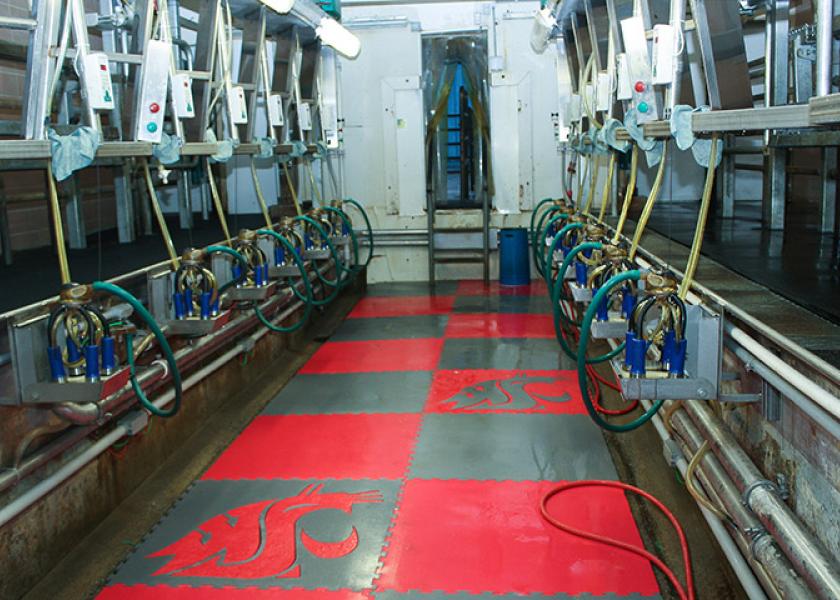Cows Milked Faster, Smarter at WSU Dairy, Thanks to Parlor Upgrade

Cows get milked faster, safer and smarter at the WSU Knott Dairy Center, thanks to a $150,000 milking parlor upgrade.
The time was right for an upgrade, said dairy manager and instructor John Swain. The recently completed remodel was the parlor’s first modernization since 1983.
With 180 Holsteins, the WSU dairy is modest in size compared with most commercial operations. Today’s cows produce far more milk than they did when the Knott Center was founded in 1962 on the former Tula Young Hastings family farm south of Pullman.
In 1950, the average U.S. dairy cow produced about 5,000 pounds of milk per year, roughly 600 gallons. Today’s cows average 23,000 pounds annually, or more than 2,700 gallons.
“We’ve quadrupled milk production in 50 years,” said Swain. The primary reasons: better genetics and management practices.
To keep up, dairies need to milk cows faster, safely. The new parlor helps students and staff in the WSU Department of Animal Sciences do just that.
Removing wasted space and aging equipment, the remodel accommodates 12 cows at a time, two more than the previous design, speeding up the farm’s two daily milking sessions, which run for 18 hours.
In a new “ParaBone” parlor layout, cows are arranged parallel to each other in herringbone rows. This allows milking from the rear instead of the side of the cow, preventing kicks, which is safer for both people and animals. Floor mats also make milking a comfortable experience for the bovines.
“There’s a lot of technology in a small package,” said Swain. New meters monitor milk weight and electrical conductivity in real time. Conductivity measures salts in milk that can show when a cow has an udder infection.
“We can see every morning how today’s milk compares to yesterday’s milk in quality and quantity, and why,” said Swain.
Fresh from the cow, milk is stored in a 4,000-gallon tank kept at 37 degrees. It is delivered every morning to the WSU Creamery, where it’s made into Cougar Golf cheese and Ferdinand’s ice cream. The WSU Creamery contributed to the renovation.
Knott Dairy Center is a 24-hour-a-day research, teaching and production operation with four regular employees, eight part-time staff and daily help from 15 members of the Cooperative University Dairy Students club, or CUDS, who tend their own small herd. The club donated funds for the remodel.
Source: Washington State University







